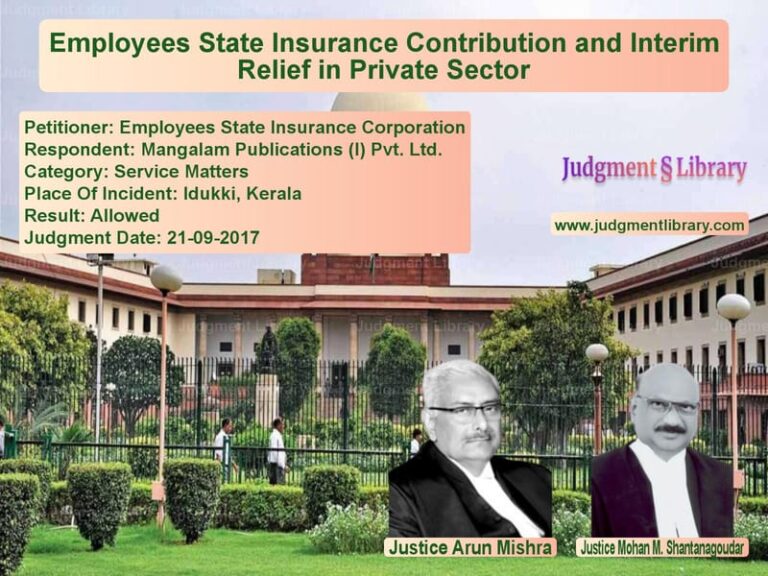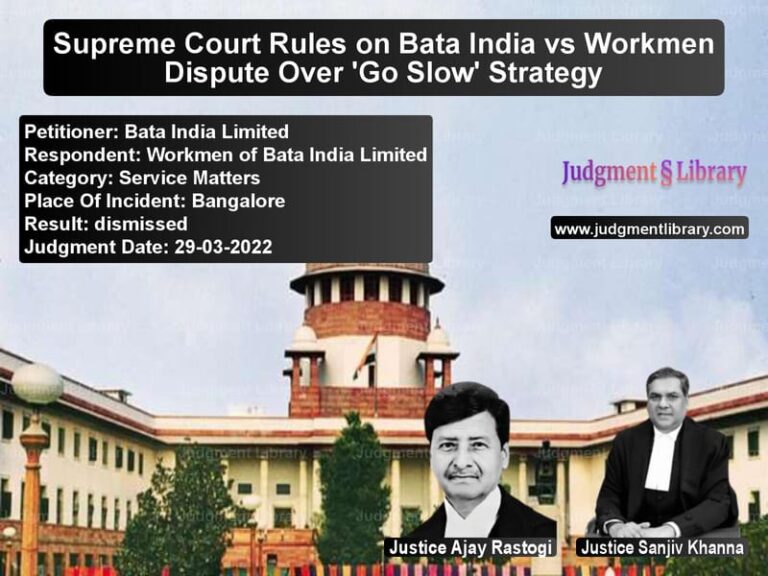Supreme Court Upholds Life Sentence in Murder Case: Examines Common Intention Under IPC
The Supreme Court of India, in the case of Gulab vs. State of Uttar Pradesh, upheld the conviction of the appellant under Section 302 read with Section 34 of the Indian Penal Code (IPC). The judgment, delivered by a bench comprising Justices Dhananjaya Y Chandrachud, A S Bopanna, and Vikram Nath, reaffirmed the principles governing common intention in criminal cases.
Background of the Case
The case arose from an incident on November 22, 1989, in District Banda, Uttar Pradesh. According to the prosecution, the deceased, Hanifa, was washing himself near a pond when the accused, Idrish and Gulab (the appellant), approached him. Idrish was armed with a .315 bore country-made pistol, while Gulab carried a lathi. Gulab allegedly exhorted Idrish, stating that their ‘enemy’ had been found. Immediately thereafter, Idrish fired at Hanifa, causing his death on the spot.
A written report was submitted at the police station at 10:30 PM, based on which a case was registered under Sections 302 and 34 IPC. The postmortem report confirmed that Hanifa died due to a gunshot injury to the chest.
Legal Issues Raised
- Whether the testimonies of ‘interested witnesses’ (relatives of the deceased) could be relied upon.
- Whether the delay in lodging the FIR weakened the prosecution’s case.
- Whether the failure to recover the firearm and examine a ballistic expert was fatal to the prosecution’s case.
- Whether the appellant’s role of exhortation was sufficient to convict him under Section 302 read with Section 34 IPC.
Petitioner’s Arguments (Gulab)
- The appellant contended that all three eyewitnesses—Shabbir (PW-1), Saddu (PW-2), and Iddu (PW-3)—were relatives of the deceased and thus interested witnesses, making their testimony unreliable.
- He argued that the five-and-a-half-hour delay in lodging the FIR indicated that the prosecution’s version was fabricated.
- He pointed out inconsistencies in witness testimonies regarding the position of the deceased when he was shot.
- The appellant argued that since the weapon was never recovered and no ballistic expert’s report was produced, the prosecution’s case was weak.
- He contended that mere exhortation, without any overt act, was insufficient to establish common intention.
Respondent’s Arguments (State of Uttar Pradesh)
- The State contended that eyewitness testimonies were consistent and could not be disregarded merely because they were related to the deceased.
- It argued that the five-and-a-half-hour delay in filing the FIR was reasonable, given the fear of reprisal in a rural setting and the distance of 11 kilometers between the crime scene and the police station.
- The prosecution emphasized that the non-recovery of the firearm was immaterial since multiple eyewitnesses had seen the accused fire the fatal shot.
- It was argued that the appellant’s role in exhorting Idrish was crucial in demonstrating common intention under Section 34 IPC.
Supreme Court’s Verdict
The Supreme Court, after analyzing the evidence, dismissed the appeal and upheld the conviction.
The Court observed:
“The presence of the appellant at the scene of occurrence is well established. The evidence of exhortation provided by prosecution witnesses is cogent and consistent. The absence of a recovered firearm does not dilute the prosecution’s case when multiple eyewitness accounts corroborate each other.”
Key Observations by the Supreme Court
- The mere fact that witnesses are related to the deceased does not make their testimony unreliable. Their presence at the scene was established beyond doubt.
- The delay in lodging the FIR was adequately explained, considering the fear of the accused and the distance to the police station.
- Even though no ballistic expert was examined, the direct eyewitness evidence was sufficient to prove the case.
- The appellant’s role in exhorting Idrish to shoot Hanifa was enough to establish common intention under Section 34 IPC.
The Court ruled:
“The High Court has correctly affirmed the conviction of the appellant. There is no reason for this Court to interfere.”
Final Order
- The Supreme Court dismissed the appeal and upheld the life sentence.
- The conviction of Gulab under Section 302 read with Section 34 IPC was confirmed.
- The appellant was directed to continue serving his life sentence.
Key Takeaways
- Eyewitness testimony matters: The Court reaffirmed that related witnesses can be relied upon if their testimonies are credible.
- Common intention under Section 34 IPC: Exhortation can be sufficient to establish joint liability in a crime.
- Delay in FIR does not always weaken the case: The Court acknowledged that delays in rural settings may be justified.
- Non-recovery of weapon is not fatal: Conviction can still be sustained based on consistent eyewitness accounts.
This judgment reinforces the legal principle that common intention in a crime does not require direct action but can be inferred from circumstances and conduct.
Petitioner Name: Gulab.Respondent Name: State of Uttar Pradesh.Judgment By: Justice Dhananjaya Y Chandrachud, Justice A S Bopanna, Justice Vikram Nath.Place Of Incident: Banda, Uttar Pradesh.Judgment Date: 08-12-2021.
Don’t miss out on the full details! Download the complete judgment in PDF format below and gain valuable insights instantly!
Download Judgment: gulab-vs-state-of-uttar-prade-supreme-court-of-india-judgment-dated-08-12-2021.pdf
Directly Download Judgment: Directly download this Judgment
See all petitions in Murder Cases
See all petitions in Bail and Anticipatory Bail
See all petitions in SC/ST Act Case
See all petitions in Judgment by Dhananjaya Y Chandrachud
See all petitions in Judgment by A. S. Bopanna
See all petitions in Judgment by Vikram Nath
See all petitions in dismissed
See all petitions in supreme court of India judgments December 2021
See all petitions in 2021 judgments
See all posts in Criminal Cases Category
See all allowed petitions in Criminal Cases Category
See all Dismissed petitions in Criminal Cases Category
See all partially allowed petitions in Criminal Cases Category







